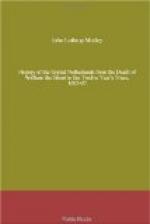Thus men in the United Provinces spake of America. Especially Barneveld had been supposed to be prominent among the opponents of the new Company, on the ground that the more violently commercial ambition excited itself towards wider and wilder fields of adventure, the fainter grew inclinations for peace. The Advocate, who was all but omnipotent in Holland and Zeeland, subsequently denied the imputation of hostility to the new corporation, but the establishment of the West India Company, although chartered, was postponed.
The archdukes had not been discouraged by the result of their first attempts at negotiation, for Wittenhorst had reported a disposition towards peace as prevalent in the rebellious provinces, so far as he had contrived, during his brief mission, to feel the public pulse.
On the 6th February, 1607, Werner Cruwel, an insolvent tradesman of Brussels, and a relative of Recorder Aerssens, father of the envoy at Paris, made his appearance very unexpectedly at the house of his kinsman at the Hague. Sitting at the dinner-table, but neither eating nor drinking, he was asked by his host what troubled him. He replied that he had a load on his breast. Aerssens begged him, if it was his recent bankruptcy that oppressed him, to use philosophy and patience. The merchant answered that he who confessed well was absolved well. He then took from his pocket-book a letter from President Richardot, and said he would reveal what he had to say after dinner. The cloth being removed, and the wife and children of Aerssens having left the room, Cruwel disclosed that he had been sent by Richardot and Father Neyen on a secret mission. The recorder, much amazed and troubled, refused to utter a word, save to ask if Cruwel would object to confer with the Advocate. The merchant expressing himself as ready for such an interview, the recorder, although it was late, immediately sent a message to the great statesman. Barneveld was in bed and asleep, but was aroused to receive the communication of Aerssens. “We live in such a calumnious time,” said the recorder, “that many people believe that you and I know more of the recent mission of Wittenhorst than we admit. You had best interrogate Cruwel in the presence of witnesses. I know not the man’s humour, but it seems to me since his failure, that, in spite of his shy and lumpish manner, he is false and cunning.”
The result was a secret interview, on the 8th February, between Prince Maurice, Barneveld, and the recorder, in which Cruwel was permitted to state the object of his mission. He then produced a short memorandum, signed by Spinola and by Father Neyen, to the effect that the archdukes were willing to treat for a truce of ten or twelve years, on the sole condition that the States would abstain from the India navigation. He exhibited also another paper, signed only by Neyen, in which that friar proposed to come secretly to the Hague, no one in Brussels to know of the visit save




